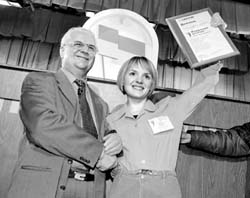Social Democrats Hand Out Posts: So Far In a Management Game

The last stage of the contest Personnel Reserve: Ukraine’s New Power initiated by the SDPU(o) was held in Kyiv’s Teachers’ House. Launched to deal with predicted acute personnel shortages, the project got under way in October last year in all 27 of Ukraine’s oblasts. Contestants, who had to have a higher education and work experience, were divided into three categories, top managers, civil servants, and managers, and had to fill in special questionnaires, which were then analyzed and graded by experts. Following the analysis of the questionnaires, 4500 contenders were selected for participation in the second round when they were interviewed by expert psychologists and sociologists. As a result, the 150 best professionals, including secretaries, deputies of oblast councils, officials of state administrations, and presidents of commercial firms, were chosen for the final round to be held in Kyiv. “It is no secret that in Ukraine our intellectual potential has not been effectively tapped,” project coordinator Valeriya Mykhailova said, adding that the state allocates large sums of money for training specialists with higher education. Nonetheless, very often university graduates cannot meet job market requirements. Things are further aggravated by the lack of centers for monitoring labor markets. This leads to a situation such that high-class specialists have to switch careers, doing work for which they have not been trained. Meanwhile, for its successful development Ukraine will soon need about 15,000 managers, experts forecast. That is why the project objective was to find specialists in Ukraine (contest participants received various level certificates) and make them available to employers to be included in their personnel reserves.
In the finals, 150 participants contended for the right to be included in Ukraine’s fifty best young specialists. They were selected on the results of a management game imitating work of government and public structures where they had to prove their abilities and skills, occupy key positions, and become informal leaders, with tensions rising to unprecedented scale during the games. For example, in the Verkhovna Rada game contenders battled to occupy top positions in the legislature, Social Democrats and Liberals factions, and in the independent deputies group, as well as locking horns in nominating a speaker, his deputy, vice speaker, and committee heads. To make the play look real, only one thing was missing, a sound signal indicating the tally of votes in Verkhovna Rada. The battles in the session hall were observed by another group of participants, acting as representatives of the Confederation of Trade Unions, the Union of Industrialists and Entrepreneurs, presidential aides, the legislative press service, a media holding, and three newspapers representing different political forces. Trade union activists and entrepreneurs could submit bills to lawmaking committees, the deputies passed laws, and the press covered the work to inform the public. In many cases imitation was close to real-life scenarios in parliament, leading to a number of humorous incidents. Thus, a candidate for speaker put up by the Liberals got so carried away that he was adamant in persuading lawmakers that he is the best person for the job because he is head of an SDPU(o) oblast organization. Later on, the Social Democratic deputies initiated a vote of no-confidence, accusing the speaker of violating parliamentary procedures. For their part, observers were equally active and secured the approval of important social laws by transferring their proxies to the Social Democrats to swing the vote their way. Women deputies sought an active role for themselves by refusing to support laws ignoring the gender factor.
Leonid Kravchuk, who headed the jury for the contest, liked the game scenario much better than the real one, primarily because the young players demonstrated their ability to reach compromises and stay aware of the real problems facing Ukraine. Many things, however, were common to both lawmaking bodies, Mr. Kravchuk believes, like ignoring parliament’s rules and mandatory use of Ukrainian in government, something which indicates a lack of basic knowledge about the work of the legislature. According to the former president, the game would have been more entertaining if participants had attempted to pass some unusual laws, for example, related to high tech. Meanwhile, those passed by the wannabe lawmakers have merely mirrored already approved laws or those on Verkhovna Rada’s waiting list. In Leonid Kravchuk’s opinion, the mistakes made by participants indicated that, despite their youth, they have not completely broken free from the totalitarian state system. After some well-meant criticism of what he saw, the former president admitted that the young contestants dealt with the state’s vital issues in a professional way, something, in his view, many domestic lawmakers lack.






